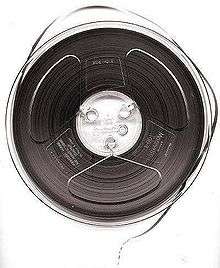Time's Encomium
Time's Encomium (Jan. 1968-Jan. 1969, 31'43") is an electronic, four channel, musical composition by Charles Wuorinen for synthesized and processed synthesized sound. Commissioned by Teresa Sterne for Nonesuch Records, it was awarded the 1970 Pulitzer Prize for Music, and was realized on the RCA Mark II Synthesizer at the Columbia-Princeton Electronic Music Center, NYC. At the time Wuorinen was the youngest composer ever to win the Pulitzer. The piece is also the first electronic piece to win the prize.[1]
Time's Encomium is the title because in this work everything depends on the absolute, not the seeming, length of events and sections. Being electronic, Time's Encomium has no inflective dimension. Its rhythm is always quantitative, never qualitative. Because I need time, I praise it; hence the title. Because it doesn't need me, I approach it respectively; hence the word 'encomium'.
According to the composer, the primary concern of the piece appears to be rhythmic, since only pure quantitative duration, as opposed to qualitative performance variable inflection, is available to one in the electronic medium, though, "the basic materials are the twelve tempered pitch classes, and pitch-derived time relations," (due to the constraints of the synthesizer).[2] As such, he composed, "with a view to the proportions among absolute lengths of events -- be they small (note-to-note distances) or large (overall form) -- rather than to their relative 'weights,'....conform[ing] to the basic nature of a medium in which sound is always reproduced, never performed."[2]
However, Wuorinen rescored the piece for standard orchestra, titled Contrafactum published by C.F. Peters.[5] The original piece was remastered and rereleased on Tzadik Records.
Sources
- ↑ (May 23, 1970). Billboard, p.4. Vol. 82, No. 21. ISSN 0006-2510.
- 1 2 3 "Time's Encomium", ArtoftheStates.org.
- ↑ Antokoletz, Elliott (2014). A History of Twentieth-Century Music in a Theoretic-Analytical Context, p.378. Routledge. ISBN 9781135037307.
- ↑ Jon H. Appleton, Ronald Perera; editors (1975). The Development and Practice of Electronic Music, p.135. Prentice-Hall. ISBN 9780132076050.
- ↑ H.W. Wilson Company (1973). Current biography yearbook, Volume 33, p.454. H. W. Wilson Co.
External links
- "Charles Wuorinen - Volume 3", CharlesWuorinen.com.
